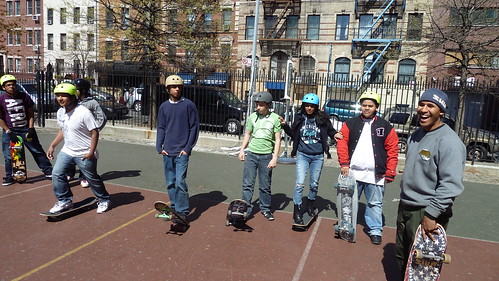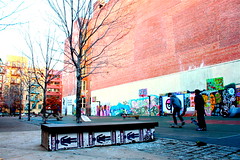On a recent afternoon, a 39-year-old man in army pants and a sweatshirt was skating the small ramps at the East Side Community High School’s playground. About three weeks ago, Benny Guerra, a native of Flushing, Queens, was hired to teach skateboaring at one of two East Village schools that offer skating – once the pastime of rebels and outcasts – as a proper elective.
Mr. Guerra, a painter with a degree from the School of Visual Arts, had been hoping to teach art, not ollieing. “Skating wasn’t even on my resume,” he told The Local in his new office, a shipping container plopped next to a basketball court that was filled with skate gear. But three weeks ago, he got a call from Billy Rohan, a skateboarding activist who ran the school’s skate park for five years with assistant principal Tom Mullen (Mr. Rohan now works full-time in advertising). “When Billy heard I was certified to teach,” said Mr. Guerra, “he said, ‘Get down here.’ It’s part-time for now but next year hopefully should be more.”
At the moment, East Side runs four classes a day for grades 6 to 12. Mr. Guerra, who has been skating since the age of nine and is well-known on the downtown scene, said, “I never even thought there would be skate parks in New York, never mind at the schools.”
A few minutes later, Jose Burgos skated over from the school. The 16-year-old student was let out of class to take a meeting with Shut, a long-running skateboarding company that sponsors both Mr. Guerra and the skate program. Shut was interested in sponsoring Mr. Burgos as well. But there was one caveat: his grades had to come up.
“I applied to this school because a friend told me they had skateboarding,” said Mr. Burgos, who lives in Ridgewood, Queens. For a time, the teenager was only attending school once a week, failing all of his classes. “Now I come every day,” he said. “I was skipping school to skate.”
Teacher and student jumped on their boards and sped down First Avenue (safely in the bike lane), grinding curbs on their way to Shut’s headquarters on Orchard Street. Founded in 1986, Shut came about when skateboarding rode a mid-to-late-80s boom on the back of California brands like Powell-Peralta and a then-teenager vert star named Tony Hawk. Shut folded in 1991, when both the economy and the skating frenzy slowed down.
In 1993, a new company called Zoo York formed. It represented downtown youth culture – the skaters, graffiti writers and hip-hop and hardcore kids. “We didn’t care about California,” Zoo York founder Adam Schatz said. “Back in the early 90s the scene was so small that you’d hear wheels around the corner and know one of your friends was about to skate by.”
Zoo York relaunched the Shut brand in 2006. The company now supports community programs like East Side’s and helps run the Harold Hunter Foundation, an organization that preserves the legacy of the late Harold Hunter, an East Villager who embodied the downtown skate scene as a star of Larry Clark’s 1994 film “Kids.”
As Mr. Guerra skated by Max Fish, one of Mr. Hunter’s old haunts, he told his student that local and visiting professional skaters hung out at the bar.
“There’s a skateboarding bar?” asked the student. “Do I need ID?”
“Don’t even think about it,” Mr. Guerra shot back. “Actually, back in the day you didn’t.”
Back at the high school, a pod of twenty or so kids waited by the playground for their 1:30 p.m. skateboarding class. The ninth graders – a multicultural mix of boys and girls – raced to grab boards and strap on helmets, preparing for drills on basic techniques.
“It’s exercise and a lifestyle, and it builds self-esteem,” Mr. Mullen said.
Around the same time that day, across First Avenue in the dean’s office of TASS Middle School, a kid with a semi-mohawk sat across from a blond girl in knee-high boots. They weren’t students in detention: they were Brian McCarthy, the school’s dean, and Lisa Sagato, who runs the school’s skate program through her non-profit, the Create Skateboard Foundation. Every Friday, Ms. Sagato takes a dozen kids on the subway down to a skate park in TriBeCa.
Ms. Sagato, who is in her late 20s, at one point presented plans to open a skate park but said she was denied by the school’s principal, who didn’t want the added liability. Her non-profit currently teaches at two other schools in Brooklyn. “I started by just showing up at the school with pro Willy Akers and Rodney Torres to do a demo,” she said. “No one really knew we were coming but the kids loved it.”
Later that night at SoHo Billards on Houston Street, a crowd gathered for a pool tournament sponsored by The Hundreds, a street wear brand popular with New York’s insular skate world (Ms. Sagato estimates there are 1,000 or so kids on the skate scene). “I’m only 22 but we never had skating at school,” said Manhattan-raised Beni Metsch. “This is new and great for the sport. Maybe in five years there will be thousand at this Hundreds party.”





